
Roadside fruit vendors share their woes, especially in the wake of the recent ‘boycott’

Fifty-five years old Gulzar Ahmad has a small cart set up along the road running through a busy locality where foot traffic is also high. So, he has more chances to sell his fruit.
It is a hot day. The sun is shining with its full might and there are no trees along the road. The canopy over the cart is worn out and there are several holes in it. The fruit is directly exposed to the sunshine. He fears that the fruit will rot if it is not sold out before the evening, and he will have to suffer the loss. It’s a fear shared by many others like him. The summer assumes entirely a different meaning when talking to fruit vendors particularly those who have pulled their carts under the open sky.
"The business of selling fruits is like digging the well every day to draw water from it to quench our thirst," says Ahmad who has been living in a small flat near Dhalley Bazaar area with his wife, two daughters and a son ever since he left Haveli Lakha, his hometown, some 25 years ago soon after his marriage.
Ahmad, like many others in the business of selling fruits, has a long workday. It usually starts with the break of dawn and ends a little before midnight. His entire day is spent dealing with grumpy customers to secure just a little profit margin. He says most of the customers are habitual of finding faults even if the fruit is fresh and bargain over each dozen of fruit they buy.
"Normally, I make somewhere between Rs500-1,000 in a day," he tells TNS. "On days when I am lucky enough to receive a good number of customers, I manage to make up to Rs2,000."
Even by a generous estimate, his average monthly income does not exceed Rs30,000.
Now let’s compare his income with his expenditures. He spends around four hundred rupees daily on buying essential food items. He has to pay Rs8,000 for his house rent at the end of every month. The utility bills are in addition to this.
He also has to spend on medicines when he or a family member falls sick. Occasionally, the family also has to pay to the magistrate or some town committee official as ‘bribe’ for the place they occupy. On top of it, Ahmad has to pay to the rickshaw driver daily for transporting fruit from the wholesale market.
These numbers just do not add up. He certainly does not look happy as he calculates his income and his expenditures but he is not disappointed either.
Gulzar Ahmad is not the only fruit cart vendor who has to work extra hours every day to make both ends meet. There are many others you’d come across, going around in the city.
Most of these people are non-natives. Muhammad Aamir Ali, for instance, is from Pakpattan, Adeel Mubashar from Chichawatni, and Muhammad Hassan from Kasur. All these fruit vendors have strikingly similar stories to tell.
They complain of having no union or association to fight for their rights and interests especially in cases where they are exploited by the dealers in wholesale market. "Customers wrongly accuse us of increased prices," says Hassan. "We cannot push the prices up, even if we wish to. The prices of different varieties of fruits fluctuate on a daily basis depending on the availability in the wholesale market."
According to another cart owner, they are not allowed in the wholesale market to check all cartons of fruit for quality; instead, they are shown only one carton which contains good quality fruit.
Terming the recent fruit buying boycott campaign unfair, Adeel Mubashar, who is a college graduate, says he suffered a lot because of the boycott. "A few days before the Ramzan began, I had borrowed Rs10,000 from a family member and bought a few cartons of relatively low quality mangoes at the rate of Rs90 per kg. Only a few customers turned up on the first day of the boycott. The number [of customers] further went down on the second day. On the third day, I had to sell mangoes for Rs50 per kg at the loss of Rs40 for every kilogramme. Yet, I could not sell the whole stock and had to throw away the remaining because it had rotten."